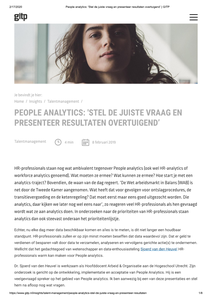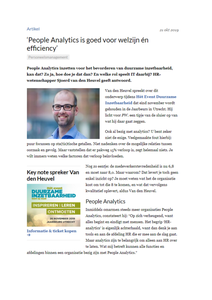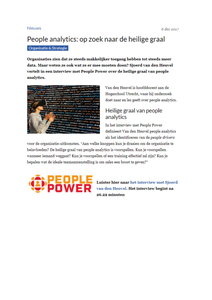Deze whitepaper is een vervolg op deze eerdere reeks over People Analytics en bespreekt de nieuwste trends. Inhoud: • Inleiding 1. Medewerkerswelzijn krijgt meer aandacht 2. HR Analytics wordt People Analytics 3. Het inzicht groeit dat People Analytics geen kant-en-klare oplossingen levert 4. De kloof tussen de vaardigheden en ambities wordt minder groot 5. Analyticsteams herbergen steeds meer expertise 6. Meer data worden gekwantificeerd 7. Steeds meer data worden van buiten de organisatie betrokken 8. Kunstmatige intelligentie kan voor onverwachte inzichten zorgen 9. Het aantal interne databronnen neemt toe 10. Er komt meer aandacht voor privacybescherming • Conclusie
DOCUMENT

Interview. “We gaan People Analytics gebruiken om duurzame inzetbaarheid te bevorderen.” Die zin zet je snel in het strategisch plan, maar hoe moet het dan? Hoe beginnen we? En hoe pas je het goed toe? Volgens Sjoerd van den Heuvel is het belangrijkste doel van people analytics niet antwoorden vinden, maar de juiste vragen stellen.
MULTIFILE

Hoofdstuk 10 in HRM Heden en Morgen. Dit hoofdstuk is geschreven vanuit de overtuiging dat een gemeenschappelijke taal en begrip van people analytics, evenals enkele basale wetenschappelijke principes waarop het gestoeld is, het jonge vakgebied in de praktijk naar een hoger niveau kunnen tillen. En daarmee de (toekomstige) HRM-professionals werkzaam op en rondom dit uitdagende thema in staat kunnen stellen (nog meer) impact te maken in hun organisatie. Het primaire doel van dit hoofdstuk is om de (toekomstige) professional die dit leest, aan het denken te zetten. Dit kan betekenen inspireren, verwarren, of duiden. Maar ook aanzetten tot het concreet aan de slag gaan met people analytics in de eigen organisatie, op de grens van wetenschap en praktijk, because that’s where the magic happens.
DOCUMENT

Whitepaper in een serie over HR Analytics. Steeds vaker worden HRM-beslissingen gebaseerd op voorspellende modellen die ontwikkeld zijn op basis van historische data. In deze whitepaper bespreken we een aantal best practices die organisaties daarbij kunnen helpen. Zo is het belangrijk om goed te letten op de oorsprong van gegevens. Objectieve meetgegevens zijn bijvoorbeeld vaak van grotere waarde dan subjectieve antwoorden uit enquêtes. Wanneer een organisatie data wil verzamelen voor een People Analytics-project, is het daarnaast belangrijk om zeker te weten dat er meetinstrumenten worden gekozen die ook echt meten wat ze beogen te meten. Inhoud: • Inleiding 1. Kies de juiste steekproef 2. Let op de grootte van de steekproef 3. Geef de voorkeur aan objectieve gegevens 4. Zorg voor valide meetinstrumenten 5. Koppel data op een privacyvriendelijke manier 6. Denk na over het gebruik van gemiddelden 7. Verwar oorzaak en gevolg niet 8. Laat je niet foppen door percentages 9. Let op verklaarde variantie 10. Kijk altijd naar de netto opbrengst 11. Voer waar nodig extra analyses uit 12. Maak voldoende tijd vrij voor Analytics • Conclusie
MULTIFILE

Interview met Sjoerd van den Heuvel. HR-professionals willen meer doen met data, maar zij missen daarvoor de kennis en vaardigheden. Dat blijkt uit onderzoek dat de Hogeschool Utrecht heeft uitgevoerd onder leden van AWVN. Hoe tilt u people analytics in uw organisatie naar een hoger plan?
MULTIFILE

Verslag van een presentatie. In onderzoeken naar de prioriteiten van HR-professionals staan analytics dan ook steevast onderaan het prioriteitenlijstje. Echter, nu elke dag meer data beschikbaar komen en alles is te meten, is dit niet langer een houdbaar standpunt. HR-professionals zullen op zijn minst moeten beseffen dat data waardevol zijn. Een Engelstalige definitie van People Analytics luidt: ‘The systematic identification and quantification of the people drivers of business outcomes, with the purpose of making better decisions.‘ Daarbij is het belangrijk om een goede businessvraag te stellen én – vervolgens –de resultaten van de analyse op overtuigende wijze over te brengen.
MULTIFILE

Whitepaper in een serie over HR Analytics Elke organisatie neemt voortdurend HRM-beslissingen, zoals over het aannamebeleid, de beloning en talentmanagement. Wanneer ze daarbij gebruik maken van predictive analytics, oftewel voorspellende analyse, kunnen organisaties de kans berekenen dat een individuele medewerker bepaald gedrag gaat vertonen. Voorspellende analyse leidt daardoor tot betere besluiten en maakt het mogelijk om gericht actie te ondernemen. Inhoud: • Inleiding 1. Zorg voor kwalitatief hoogwaardige data 2. Maak de stap van dataverzameling naar rapportage 3. Ontwikkel voorspellende modellen op basis van historische data 4. Gebruik voorspellende modellen om inzicht te krijgen 5. Baseer HRM-maatregelen op inzichten uit voorspellende analyses • Conclusie
MULTIFILE

Despite the promises of learning analytics and the existence of several learning analytics implementation frameworks, the large-scale adoption of learning analytics within higher educational institutions remains low. Extant frameworks either focus on a specific element of learning analytics implementation, for example, policy or privacy, or lack operationalization of the organizational capabilities necessary for successful deployment. Therefore, this literature review addresses the research question “What capabilities for the successful adoption of learning analytics can be identified in existing literature on big data analytics, business analytics, and learning analytics?” Our research is grounded in resource-based view theory and we extend the scope beyond the field of learning analytics and include capability frameworks for the more mature research fields of big data analytics and business analytics. This paper’s contribution is twofold: 1) it provides a literature review on known capabilities for big data analytics, business analytics, and learning analytics and 2) it introduces a capability model to support the implementation and uptake of learning analytics. During our study, we identified and analyzed 15 key studies. By synthesizing the results, we found 34 organizational capabilities important to the adoption of analytical activities within an institution and provide 461 ways to operationalize these capabilities. Five categories of capabilities can be distinguished – Data, Management, People, Technology, and Privacy & Ethics. Capabilities presently absent from existing learning analytics frameworks concern sourcing and integration, market, knowledge, training, automation, and connectivity. Based on the results of the review, we present the Learning Analytics Capability Model: a model that provides senior management and policymakers with concrete operationalizations to build the necessary capabilities for successful learning analytics adoption.
MULTIFILE

Interview met Sjoerd van den Heuvel. Er is steeds meer aandacht voor toepassingen van analytics, maar men komt meestal niet verder dan alleen maar meten en vooral heel veel data vastleggen. ‘Maar dan ben je bezig met reporting en benchmarking, in plaats van met causaliteitsanalyses en voorspéllende analytics, die veel zinniger zijn. Die laatste maken deel uit van People Analytics, waarmee je duurzame waardecreatie kunt nastreven.
MULTIFILE

Organisaties zien dat ze steeds makkelijker toegang hebben tot steeds meer data. Maar weten ze ook wat ze er mee moeten doen? Sjoerd van den Heuvel vertelt in een interview met People Power over de heilige graal van people analytics.
MULTIFILE
